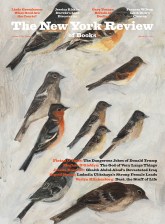In response to:
Tools to End the Poverty Pandemic from the January 18, 2024 issue
To the Editors:
In “Tools to End the Poverty Pandemic” [NYR, January 18], Matthew Desmond has made two false claims about my book, The Viral Underclass: The Human Toll When Inequality and Disease Collide: “Inexplicably, The Viral Underclass ignores pandemic aid altogether” and “Thrasher even goes so far as to claim that during the pandemic the government ‘left us to fend for ourselves.’”
First, the Biden-backed Coronavirus Aid, Relief, and Economic Security (CARES) Act Desmond writes about at length passed on March 27, 2021. The Viral Underclass was turned in to my publisher on February 1, 2021: “I turned in the final manuscript of this book’s first edition, in the first days of the Biden Administration.”
Second, I wrote extensively about aid throughout the book, especially the tens of billions spent on vaccine development and distribution, and particularly on why people in the United States who have been burned by hidden, profit-driven health care costs might have been wary of accepting free governmental medical aid. But I wrote about aid much, much more extensively in the afterword to the paperback edition, the publication of which coincided with Desmond’s essay (and from which Desmond quoted, albeit misleadingly). Writing in the summer of 2023, I wrote—with sadness—that “the gaps in the social safety net triggered by Covid had long since vanished”; that “the Biden administration did throw almost everything it could at getting Americans vaccinated” in 2021; that “throughout the Spring of 2022, the Democrats tried to pass further Covid relief money,” but “in an ill-conceived spending resolution, they bundled about $10 billion of Covid relief with $33 billion to send to Ukraine” and later “jettisoned the Covid money”; that New York government aid meant “buses were free, to protect drivers and to make life a little less dangerous for workers,” so I wondered, “Might they stay free forever? Were we investing in the commons of a permanent public good?”; and, of the 2022 monkeypox (MPX) pandemic, I wrote how I missed the dismantled “Covid vaccine delivery infrastructure, which recently had the capacity to deliver up to four million shots a day.” But most importantly, I wrote how initially, “anyone in the country could show up at a hospital or drive-through testing site to get medical help for Covid” and asked, “Couldn’t we do the same for cancer—or for any illness?”
(In other words, The Viral Underclass ended with me mourning the loss of the very pandemic aid Desmond accused me of “inexplicably” ignoring “altogether.”)
Third, when Desmond wrote “Thrasher even goes so far as to claim that during the pandemic the government ‘left us to fend for ourselves,’” (emphasis added), he misrepresented one important word. Desmond, presumably, referred to “the government,” singular, as that of the United States. But the text reads “When governments around the world left us to fend for ourselves in the Covid-19 pandemic” (emphasis added). I wrote about how various governments, plural, had abandoned their peoples at the beginning of Covid—and how folks globally looked to ACT UP AIDS activists like Sean Strub (who coined the term “the viral underclass”) for how to organize in a plague.
Which brings me to my fourth and final point: Desmond has misrepresented the basic premise of my book. The Viral Underclass is not a “Covid book” as such, nor a book about pandemic poverty; it is a book about the social vectors which drive various pathogens (HIV, Covid, MPX) to transmit. Capitalism, which causes poverty, is but one vector of a dozen I identify. To the extent the book is primarily about one epidemic, it is foremost about the forty-year HIV/AIDS pandemic, which has killed 40 million people (and counting) but which Desmond never mentions once in his 4,300+ word essay. Indeed, the introduction (“An Invitation”) and chapters 1, 2, 4, 5, 7, 8, and 11 of The Viral Underclass are largely based on my doctoral research on HIV/AIDS conducted between 2013 and 2019—before SARS-CoV-2 was first identified in Wuhan, China.
I do not mind if Desmond disagrees with my arguments. But I do not believe he should be allowed to misrepresent what I wrote.
Steven W. Thrasher
Chicago, Illinois
Matthew Desmond replies:
My review focused on the government’s response to the economic insecurity experienced by Americans during the Covid pandemic. I disagree with Thrasher’s characterization of that response, but I admire much else about his book, including his reporting on the HIV/AIDS pandemic, health policy, and more.
Thrasher’s letter quotes at length from the paperback version of The Viral Underclass, which had not yet been published when my review went to press in mid-December. (I reviewed the book in hardcover. My review does not quote from the paperback.) The hardcover version does not mention the government’s major economic relief packages, two of which were passed by bipartisan consensus before the book’s completion, including the CARES Act (which became law in 2020, not 2021). I am heartened that the book’s new afterword does.
Advertisement
On multiple occasions, Thrasher claims that the US government largely neglected its people during Covid, but it did not. He writes:
As Americans fell into poverty and begged for relief in the pandemic, the federal government could have taxed the wealthy more, taxed corporations (whose wealth is built by workers), and printed money to send to people to keep them from falling into starvation or homelessness. This largely did not happen.
While the US government didn’t raise taxes on corporations or the wealthy, it did distribute a considerable amount of money, through stimulus checks and other aid. This helps to explain why both food insecurity and homelessness fell during Covid.
During a catastrophic pandemic, bold government action brought about historic declines in poverty. That we should permanently adopt the most effective programs is something on which Professor Thrasher and I can almost certainly agree.
This Issue
March 21, 2024
Who Should Regulate Online Speech?
Laugh Riot
Small Island



